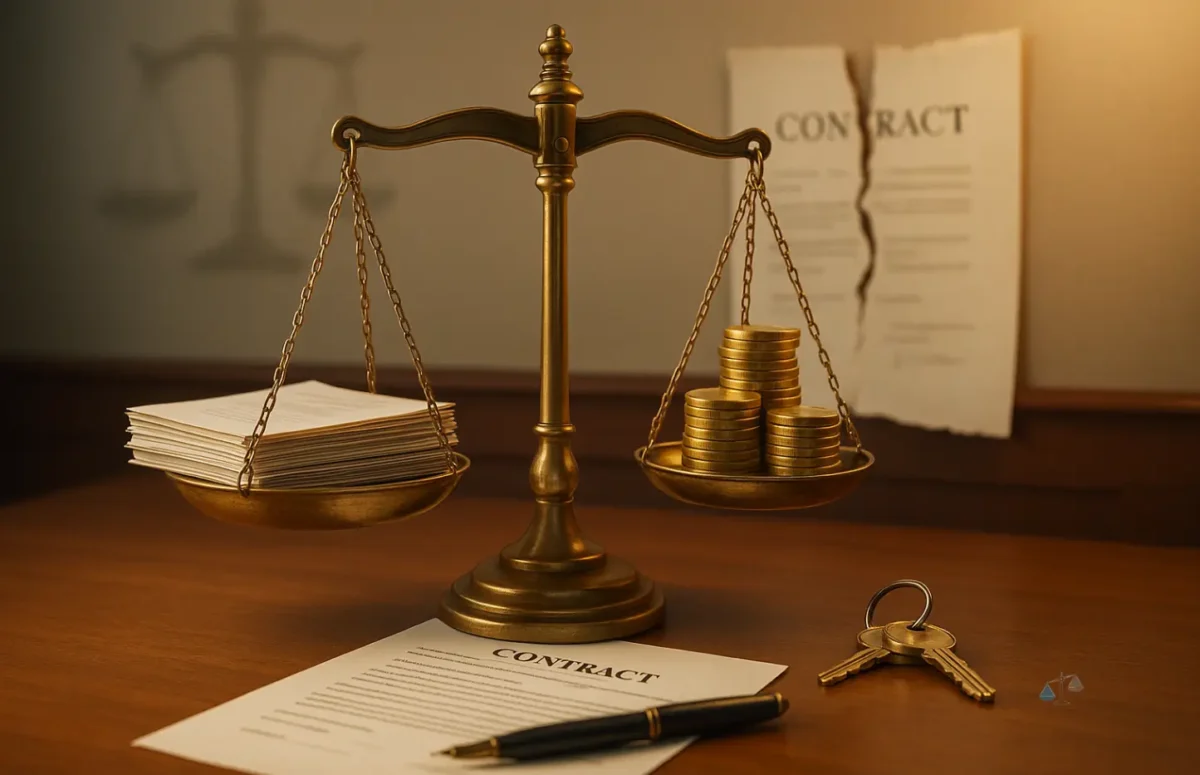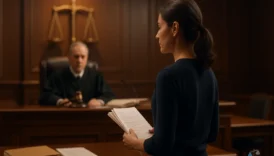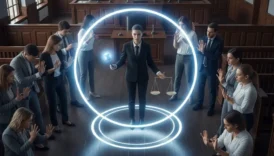Quantum Meruit: Definition and Meaning

What is a Quantum Meruit?
Quantum meruit (Latin for “as much as he deserves”) is a legal doctrine that allows a person to recover the reasonable value of services provided when a contract does not exist or cannot be enforced.
It falls under equitable law, aiming to prevent unjust enrichment — meaning one party should not unfairly benefit at another’s expense.
In simpler terms, quantum meruit ensures that if someone performs work or provides a benefit expecting payment, they can be compensated even without a formal agreement.
This principle frequently applies in construction, consulting, freelance, and partnership disputes, where partial performance or informal arrangements occur.
“Quantum meruit bridges the gap between fairness and formality — where law meets equity.”
Legal Basis and Key Principles
The doctrine of quantum meruit is rooted in common law and equitable remedies.
Its function is not to enforce a missing contract, but to restore fairness through compensation equivalent to the value of the work done.
1. Elements Required to Claim Quantum Meruit
A successful quantum meruit claim usually requires proof of the following:
- Performance of Services: The claimant provided work or services for another party.
- Expectation of Payment: The claimant reasonably expected to be compensated.
- Acceptance or Benefit: The recipient knowingly accepted and benefited from those services.
- Absence of Enforceable Contract: No valid or complete contract existed covering the same services.
Example Case:
In United States v. Algernon Blair, Inc. (1973), a subcontractor recovered the value of labor and materials supplied under quantum meruit after the main contractor breached their agreement.
The court reasoned that denying payment would result in unjust enrichment of the breaching party.
Quantum Meruit vs. Contract Law
Although quantum meruit often arises in contractual disputes, it operates independently of contract enforcement.
It applies when:
- No valid contract exists, or
- A contract is unenforceable, incomplete, or terminated early.
| Scenario | Can Quantum Meruit Apply? | Reason |
|---|---|---|
| Oral agreement with no written terms | Yes | Contract unenforceable but service rendered. |
| Contract void due to illegality | No | Courts won’t reward unlawful acts. |
| Terminated project after partial completion | Yes | Payment for completed portion allowed. |
| Contract covers the same service | No | Express contracts override equity. |
Key Difference:
- Contract Law enforces promises.
- Quantum Meruit enforces fairness when no promise can be enforced.
“Contracts bind by words; quantum meruit binds by justice.”
Applications in Modern Legal Practice
Quantum meruit appears across various fields, especially where services are rendered under uncertain or disputed terms.
1. Construction and Real Estate
Contractors often invoke quantum meruit when:
- A project is halted midway,
- Work exceeds the scope of a written contract, or
- The contract fails for technical reasons.
Example:
A builder completes 70% of a house before the client cancels.
Even without a finished contract, the builder can claim compensation for the fair value of completed work.
2. Employment and Freelance Services
Freelancers and consultants frequently rely on quantum meruit when verbal agreements break down.
Courts recognize implied contracts where payment is customary or clearly expected.
3. Medical and Emergency Services
Doctors or hospitals may claim compensation for services rendered without an express agreement — such as emergency treatment to an unconscious patient.
4. Partnerships and Joint Ventures
Used when one party contributes significant effort or resources before formal agreements are finalized.
“Quantum meruit restores fairness where paperwork failed but performance prevailed.”
Quantum Meruit and Unjust Enrichment
At its core, quantum meruit exists to prevent unjust enrichment — the situation where one person unfairly benefits at another’s expense without providing compensation.
Courts apply this equitable principle to ensure that fairness triumphs over formality when contractual remedies are unavailable.
1. The Link Between the Two Doctrines
While unjust enrichment is the broad equitable foundation, quantum meruit is the specific legal remedy derived from it.
In other words:
- Unjust Enrichment asks: Did one party receive an unfair benefit?
- Quantum Meruit answers: What is the fair value of that benefit?
| Doctrine | Focus | Outcome |
|---|---|---|
| Unjust Enrichment | Prevents unfair gain | Establishes obligation to repay. |
| Quantum Meruit | Values rendered services | Determines amount owed. |
Illustrative Example:
A marketing consultant develops a full strategy for a client before a contract is finalized.
The client uses the work but refuses to pay, claiming “no signed agreement.”
A court may order compensation under quantum meruit, reasoning that the client unjustly benefited.
“Equity demands repayment not because a promise was broken — but because silence profited from another’s labor.”
Legal Limits and Defenses to Quantum Meruit
Despite its fairness-based appeal, quantum meruit is not limitless.
Courts impose strict boundaries to prevent misuse and preserve contractual certainty.
1. Express Contract Rule
If a valid contract already governs the same subject matter, quantum meruit cannot override it.
Claimants cannot seek extra payment under equity for services already covered by agreement.
2. Illegality or Misconduct
If the underlying transaction involves illegal conduct, courts will not grant relief — no equitable compensation for unlawful acts.
For example, unlicensed contractors in certain states cannot claim payment under quantum meruit.
3. Volunteer Doctrine
If a person provides services without request or expectation of payment, they cannot later demand compensation.
The doctrine only protects those who acted in good faith expecting fair remuneration.
4. Failure of Proof
Courts require clear, measurable evidence of benefit and value.
Mere assertion of work performed is insufficient without documentation, receipts, or witness testimony.
“Equity aids the vigilant, not the volunteer.”
How Courts Calculate “Fair Value”
The measure of recovery under quantum meruit is not arbitrary — it is the reasonable market value of the benefit conferred.
Courts often use industry standards, expert testimony, or comparable rates to determine compensation.
Factors Considered
- Nature and complexity of services rendered.
- Time and effort invested.
- Market value of comparable work.
- Quality and results achieved.
- Customary rate for similar professionals or trades.
Example (Construction Context):
If a contractor completes half of a $200,000 project before termination, the court may award $100,000 — adjusted for defects or incomplete work.
Partial Performance Scenario
When a contract exists but cannot be completed (e.g., canceled mid-project), quantum meruit provides a fair alternative to full breach claims.
It ensures compensation proportional to work actually performed.
“Quantum meruit is the legal mirror of fairness — reflecting only what was earned, nothing more.”
Applications Across Legal Fields
Quantum meruit is not confined to a single branch of law.
Its flexibility makes it one of the few doctrines that operates at the intersection of contract, tort, and employment law.
1. Contract Law
Quantum meruit is most common in disputes involving incomplete, invalid, or breached contracts.
If one party performs part of a contract that later fails, courts allow payment for the completed portion to avoid unfair enrichment.
Example:
A graphic designer delivers half of a branding project before the client cancels the agreement.
Even if the contract was never finalized or fully enforceable, the designer can claim compensation equal to the market value of the completed work.
The doctrine does not reward failure — it compensates honest effort that generated measurable benefit.
2. Tort Law
In certain cases, quantum meruit overlaps with tort principles, particularly in situations involving wrongful interference or misrepresentation.
If one party induces another to work under false pretenses or misleading assurances, courts may order compensation to restore fairness, even absent a valid contract.
Illustration:
A contractor begins work after a false promise of future payment.
Though fraud may be actionable as a tort, quantum meruit provides the equitable path to recover the labor’s value rather than punitive damages.
This distinction underscores its nature: compensatory, not punitive.
3. Employment and Professional Services
Employees and independent contractors sometimes perform work before their hiring or payment terms are formalized.
In such cases, courts recognize implied contracts through the conduct of the parties.
Common Scenarios:
- An employee begins working after a verbal job offer but before signing paperwork.
- A consultant completes deliverables before a written retainer is executed.
- A professional provides urgent services requested without time for negotiation.
Judicial View:
The law presumes that when services are knowingly accepted, reasonable compensation is owed, even if the paperwork lags behind.
Procedural Steps to File a Quantum Meruit Claim
Courts treat quantum meruit as a civil action in equity.
Although procedures vary by jurisdiction, claimants generally follow these foundational steps.
Step 1: Establish the Relationship
The plaintiff must prove they provided identifiable services or materials to the defendant’s benefit.
Evidence can include contracts, invoices, communications, or witness statements.
Step 2: Demonstrate Expectation of Payment
Courts require proof that the plaintiff expected payment and the defendant was or should have been aware of this expectation.
Step 3: Show Absence or Failure of Contract
If a written or oral contract covers the work, the claim may fail.
Therefore, claimants must prove no enforceable contract exists or that the original contract failed due to circumstances like breach or invalidity.
Step 4: Quantify the Fair Value
Provide expert assessments, industry rates, or comparable invoices to justify the amount sought.
Step 5: Seek Equitable Relief
Plaintiff petitions the court to order restitution — payment equivalent to the reasonable value of benefit conferred.
| Stage | Objective | Evidence Typically Required |
|---|---|---|
| Filing Claim | State cause of action (quantum meruit) | Complaint and supporting affidavit |
| Discovery | Gather proof of service and benefit | Invoices, witness statements |
| Trial | Determine value and fairness | Expert testimony, market valuation |
Equity demands transparency — a quantum meruit claim succeeds only when good faith and clarity accompany the work performed.
Key Case Studies and Judicial Precedents
Over centuries, courts have refined quantum meruit through precedent, clarifying when fairness outweighs formality.
Below are landmark cases that shaped the doctrine in common law.
1. United States v. Algernon Blair, Inc. (1973)
A subcontractor stopped work after the main contractor breached the agreement.
Even though no full contract performance occurred, the court allowed recovery for the reasonable value of services rendered, emphasizing that equity demands compensation for partial but beneficial work.
Legal Principle:
A non-breaching party can recover in quantum meruit even without completing performance, as long as their contribution provided measurable value.
2. Britton v. Turner (1834)
In this early American case, a laborer hired for one year quit after nine months.
Despite breaching the employment term, he was entitled to payment for the work performed because the employer benefited.
Significance:
This decision established that partial performance may justify proportional compensation — marking the transition from rigid contract enforcement to equitable fairness.
3. Planche v. Colburn (1831) [U.K.]
An author hired to write a book was prevented from completing it when the publisher canceled the project.
The court awarded him compensation for the work already done.
Legal Lesson:
Even if performance is interrupted by the other party, quantum meruit ensures restitution for the effort and time already invested.
Comparative Legal Perspectives
United States (Common Law Jurisdiction)
In the U.S., quantum meruit functions as a subset of unjust enrichment claims, often overlapping with implied-in-fact contracts.
Courts rely on equity to prevent one-sided benefits, especially in service industries, construction, and employment disputes.
United Kingdom
The doctrine has a similar foundation but is classified under restitutionary claims.
U.K. courts distinguish between:
- Quantum meruit for breach or prevention, and
- Quantum meruit under mistaken payment or no contract.
The approach remains pragmatic, focusing on value conferred rather than contract completion.
Civil Law Systems (Europe, Latin America)
While “quantum meruit” is not used by name, similar principles exist under doctrines like unjust enrichment (enrichissement sans cause, enriquecimiento injusto).
These systems treat compensation as restoration of value, requiring proof that one party gained without legal basis.
Across legal cultures, the principle remains constant: where one party benefits unjustly, restitution follows — regardless of contract form.
Quantum Meruit in the Digital and Freelance Economy
Modern gig work, digital consulting, and creative services have reignited the importance of quantum meruit.
Many freelancers and small contractors work under informal arrangements or incomplete online agreements, making the doctrine a practical safeguard.
Contemporary Examples
- Freelancers delivering content or code before full payment terms are finalized.
- Designers or developers providing preliminary work under verbal agreements.
- Consultants performing market research without a finalized contract due to project cancellation.
Courts increasingly apply quantum meruit in these contexts, recognizing that digital work still holds measurable value — even when conducted remotely or informally.
Practical Advice for Modern Professionals
- Always document communications and deliverables.
- Keep digital records of work time, progress, and client correspondence.
- Avoid “free trial” work without clear terms — once delivered, recovery depends on proving expectation of payment.
In the digital age, fairness travels at the speed of data — and quantum meruit remains its legal backbone.
Limitations and Future of Quantum Meruit
While quantum meruit plays a vital role in ensuring fairness, courts remain cautious in expanding its reach.
If applied too broadly, it risks undermining the certainty that contracts bring to commerce.
Therefore, modern judges draw careful boundaries around the doctrine to preserve the balance between equity and predictability.
1. The Boundaries of Equity
- Contract Supremacy: If a valid contract governs a relationship, it overrides any quantum meruit claim.
- Proof Requirement: Plaintiffs must show not only benefit but also the value of that benefit.
- No Reward for Bad Faith: Equity refuses relief to those acting dishonestly, illegally, or opportunistically.
Quantum meruit rewards fairness, not opportunism.
2. Judicial Caution in Expansion
Courts increasingly face attempts to invoke quantum meruit in startup collaborations, AI development projects, and creative partnerships where contracts are vague or nonexistent.
Judges often scrutinize these claims to ensure that plaintiffs are not using equity to rewrite failed deals.
Emerging Principle:
The doctrine’s future depends on reasonable reliance — if one party reasonably relied on good-faith expectations of payment, the law will step in.
If the relationship reflects speculative risk, no remedy will be granted.
3. The Future in a Contract-Light World
As global commerce grows more digital and informal, quantum meruit will continue serving as a safety valve for fairness.
Blockchain-based transactions, automated services, and AI-generated work may further challenge traditional contract law — but equity adapts.
Courts may one day decide how to value algorithmic labor or AI-assisted creative output under quantum meruit principles.
The doctrine’s moral heart — “pay for what was earned” — remains relevant in every technological era.
Fairness has no expiration date, and quantum meruit ensures justice survives where contracts fail.
Author Note
This article explains the doctrine of quantum meruit in plain, practical terms for readers seeking to understand how law measures fairness when formal contracts fall short. Examples are for educational purposes only and do not constitute legal advice. Because laws differ by jurisdiction, readers facing similar disputes should consult a licensed attorney for guidance tailored to their case.
FAQ — Quantum Meruit
What does quantum meruit mean in law?
Quantum meruit means “as much as he deserves.”
It allows a person to recover reasonable payment for services provided when no valid contract exists, preventing unjust enrichment.
Can quantum meruit apply if a written contract exists?
No, if a valid and enforceable contract covers the same services, quantum meruit does not apply.
It only fills gaps where contracts fail or do not exist.
How do courts calculate compensation under quantum meruit?
Courts determine payment based on the market value of work performed, considering factors like time, complexity, and benefit received.
Is quantum meruit the same as unjust enrichment?
Not exactly. Unjust enrichment is the broad principle preventing unfair gain, while quantum meruit is the specific legal remedy to measure compensation.
Can freelancers or consultants use quantum meruit?
Yes. If freelancers complete work without a finalized contract but the client benefits, they can claim payment under quantum meruit, provided payment was expected.
What are the limitations of quantum meruit claims?
They cannot override existing contracts, reward illegal work, or apply to volunteers who never expected payment.
Proof of benefit and value is essential.
How is quantum meruit used in construction disputes?
It allows builders to claim fair payment for completed work if a project is terminated early or if no valid written contract governs the performed services.
Why is quantum meruit important today?
In a world of digital freelancing and informal agreements, it ensures fairness by compensating honest labor even when formal contracts are absent.






